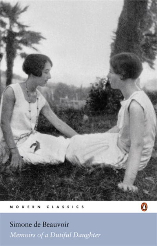I was born at four o'clock in the morning on the 9th of January 1908 in a room fitted with white-enamelled furniture and overlooking the boulevard Raspail. In the family photographs taken the following summer can be seen ladies in long dresses and ostrichfeather hats and gentlemen wearing boaters and panamas, all smiling at a baby: they are my parents, my grandfather, uncles, aunts; and the baby is me. My father was thirty, my mother twenty-one, and I was their first child. I turn the page: here is a photograph of Mama holding in her arms a baby who isn't me; I am wearing a pleated skirt and a tam-o'-shanter; I am two and a half, and my sister has just been born. I was, it appears, very jealous, but not for long. As far back as I can remember, I was always proud of being the elder: of being first. Disguised as Little Red Riding Hood and carrying a basket full of goodies, I felt myself to be much more interesting than an infant bundled up in a cradle. I had a little sister: that doll-like creature didn't have me.
I retain only one confused impression from my earliest years: it is all red, and black, and warm. Our apartment was red: the upholstery was of red moquette, the Renaissance dining-room was red, the figured silk hangings over the stained-glass doors were red, and the velvet curtains in Papa's study were red too. The furniture in this awful sanctum was made of black pear wood; I used to creep into the knee-hole under the desk and envelop myself in its dusty glooms; it was dark and warm, and the red of the carpet rejoiced my eyes. That is how I seem to have passed the early days of infancy. Safely ensconced, I watched, I touched, I took stock of the world.
My feeling of unalterable security came from the presence of Louise. She used to dress me in the mornings and undress me at night; she slept in the same room as myself. Young, without beauty, without mystery -- because she existed, as I thought, only in order to watch over my sister and myself -- she never raised her voice, and never scolded me without good reason. Her calm gaze protected me when I made sand-pies in the Luxembourg Gardens and when I nursed my doll Blondine who had descended from heaven one Christmas Eve with a trunk containing all her clothes. As dusk began to fall she used to sit beside me and show me pictures and tell me stories. Her presence was as necessary to me, and seemed to me just as natural, as the ground beneath my feet.
My mother, more distant and more capricious, inspired the tenderest feelings in me; I would sit upon her knees, enclosed by the perfumed softness of her arms, and cover with kisses her fresh, youthful skin. Sometimes, beautiful as a picture, she would appear at night beside my bed in her dress of green tulle decorated with a single mauve flower, or in her scintillating dress of black velvet covered with jet. When she was angry with me, she gave me a 'black look'; I used to dread that stormy look which disfigured her charming face: I needed her smile.
